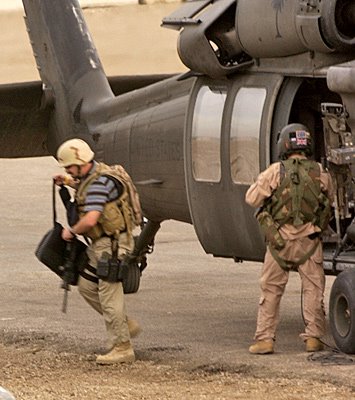
Air Force Crews Lauded for Combat Rescue Mission
By Sgt. Sara Wood, USA
American Forces Press Service
WASHINGTON, Dec. 5, 2005 � Two Air Force combat search and rescue crews are being awarded the MacKay Trophy today for a rescue mission in Iraq in April 2004.
Members of the 41st Rescue Squadron and the 38th Rescue Squadron who made up the crews of Jolly 11 and 12, out of Moody Air Force Base, Ga., are being awarded the trophy for rescuing the five-person crew of an Army CH-47 Chinook helicopter that crashed in a sandstorm near Kharbut, Iraq, Apr. 16, 2004. The airmen will receive the trophy this evening at a banquet.
The MacKay Trophy is awarded and administered by the Air Force and the National Aeronautic Association annually for the most meritorious flight of the year by an Air Force person, group or organization.
The April rescue mission was unique because the two Air Force helicopters had to go into the sandstorm and deal with almost zero visibility to get to the survivors of the Chinook crash, said Air Force Capt. Bryan Creel, who was the aircraft commander of Jolly 11. Creel and the other airmen who participated in the mission told their story today at a Pentagon news conference.
The rescue squadrons were stationed north of Baghdad, and, as they flew past Baghdad toward the crash site, visibility began to deteriorate, Creel said. The two pilots were using night vision, but there was no moon and the sandstorm decreased visibility even more, he said.
Once the helicopters entered the sandstorm, the pilots lost sight of each other and the ground and were forced to split up to ensure their safety, Creel said. They both went north, clear of the sandstorm, to regain their bearings, and decided to fly toward the crash site at an extremely low altitude, under the sand, he said.
The aircraft were unable to establish communication with the survivors on the ground, so they had to rely on visual identification of the survivors by crewmembers, Creel said. Because of the low visibility, the entire crew had to help fly the aircraft by looking for survivors and informing the pilot of air speed and altitude, he said.
"Normally, we are very methodical about how we do business because we train and we train and we train," Creel said. "We train to do this in any weather and any visibility, but when things are not going exactly the way you had trained for, you kind of have to think in different ways."
The Chinook crew had been waiting for a rescue since going down during a re-supply mission hours earlier. According to the crew, the combat rescue helicopters were a welcome sight.
"The sight of these guys coming in those two aircraft to pick us up -- that was one of the best sights I've ever seen in my life," said Army Chief Warrant Officer Steve Froeschile, pilot-in-command of the Chinook.
The rescue crews were just as relieved to see the survivors, Creel said.
"You go out there with body bags to pick people up, and you see guys there on the ground and you think, 'You know, we've got to find a way to get these guys out,'" he said.
After picking up the survivors, the combat rescue crews had to figure out a safe way to get out of the sandstorm, said Air Force Capt. Rob Wrinkle, who was aircraft commander of Jolly 12. Again, because of low visibility, the two helicopters separated until they were clear of the sandstorm, Wrinkle said.
As soon as the aircraft met back up, they began to take rocket-propelled-grenade and missile fire from insurgents on the ground, Wrinkle said. The helicopters provided .50-caliber machine gun fire for each other to deter the insurgents and evaded the enemy until they landed at the Balad hospital landing pad, he said.
The Air Force is the only service that performs combat search-and-rescue missions for all branches of service, Creel said. Because of this demand, the crews have to constantly train and always be ready to go on missions, he said.
"As much as we want to go out there and do it, we know that when we have to, it's usually bad weather, it's usually low illumination and somebody's hurt," he said.
Creel said that he and the other crewmembers are honored to receive the MacKay Trophy, which has gone to many great heroes before them.









0 Comments:
Post a Comment
<< Home